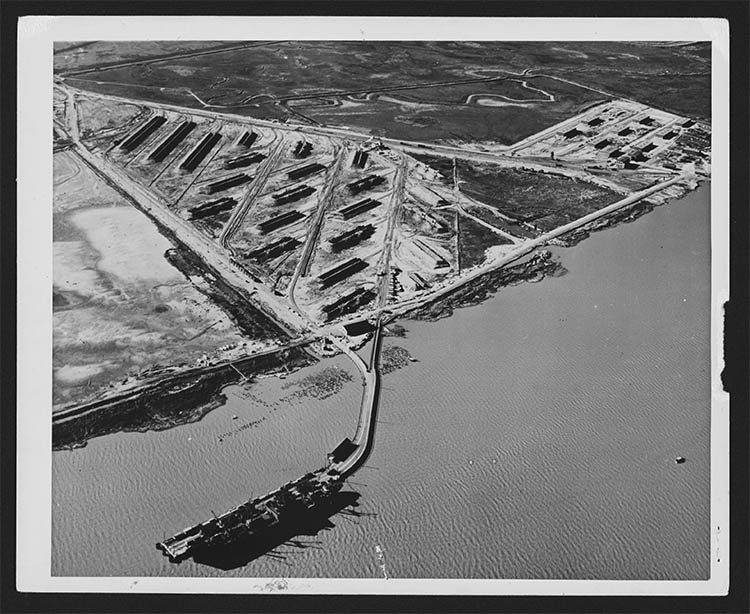‘This base is going to blow sky high.’ Port Chicago, 75 years later
Newly released recordings from Oral History Center shed light on disaster

July 17, 2019
A new collection of eight oral history interviews recounts little-known details of the Port Chicago disaster, a harrowing munitions explosion on July 17, 1944, at the Port Chicago Naval Magazine, a major shore-to-ship weapons distribution center near Concord, California.
A series of blasts killed 320 sailors, most of whom were black, and was a little-known blemish on the U.S. Navy.
The interviews, digitized for the first time by the Bancroft Library’s Oral History Center at UC Berkeley, are being released today (Wednesday, July 17) to recognize the 75th anniversary of the deadly explosion.
The roughly 20 hours of recordings document how the sailors lived on the segregated naval base, responded to the explosion, organized a mutiny to protest unsafe working conditions and dealt with an unfair and racially biased Navy disciplinary process.
One of the sailors, Joe Small, was 22 when the explosion rocked the port at the former Concord Naval Weapons Station. As one of the older enlisted men, he was recognized as a leader by the white officers and black enlisted men.
Speaking with in 1982 with Robert Allen, now a Berkeley emeritus professor, Small described how he had warned his white superiors numerous times that the black men loading and unloading ammunition onto ships, without proper safety training, were putting their lives at risk. The munitions they were handling weren’t inactive, as the men thought, but actually were bombs with warheads.
“Everybody there knew it was coming,” Small told Allen, who recorded the interview on analog tapes while researching his 2006 book The Port Chicago Mutiny. “I used to tell Lieutenant Delucchi — I said, ‘Lieutenant, one of these days, this base is going to blow sky high.’ He said: ‘Well, if it does, you won’t know anything about it. Don’t worry about it.’ That was his answer.”
The explosion happened while crews of men were racing to load two naval transport ships with 1,000-pound bombs, 40 mm shells, incendiary explosives and other weapons. All 320 men working on the dock were instantly killed, and another 390 sailors and civilians were injured. Both ships were destroyed.
The series of blasts was felt as far away as Berkeley, where it registered on instruments with the equivalent force of a 3.4 magnitude earthquake. Investigators never determined what caused the explosion.
In the following days, white officers demanded that the black enlisted men — many of whom had witnessed the explosion — return to work loading munitions. Hundreds of them refused, and 50 were eventually accused of mutiny and sentenced in military court proceedings to 15 years of hard labor.
Cyril Sheppard, one of the sailors interviewed by Allen, remembered the feeling of being told he had been convicted.
“They came into the brig, and they had us all lined up there with machine guns all around,” he said. “They told us we’d been found guilty and sentenced to 15 years. My knees almost hit the ground!”

An archival photo shows the damage caused by the July 17, 1944 Port Chicago explosion. (Photo courtesy National Park Service)
The men’s sentences were eventually reduced, but the disaster remains a little-known episode in civil rights, Bay Area and military history. A bill passed in the U.S. House of Representatives this month aims to exonerate the 50 men convicted of mutiny.
Bancroft Library staff hope the newly digitized recordings can be used in Bay Area classrooms and at a new park that will be built around a National Park Service memorial to the explosion.
“I feel like, if this had happened to white service members, this wouldn’t have been forgotten,” said Charissa Fitzpatrick, a researcher with the Oral History Center who said she had never heard of Port Chicago before working on the project. “If 300 white sailors had died in an explosion, there would have been an immediate question: ‘How do we fix these safety concerns?’”

An aerial view of the Port Chicago Naval Magazine. (Photo courtesy National Park Service)
Fitzpatrick said the lessons of Port Chicago have value in 2019.
“There’s still discrimination, there are still misunderstandings, there’s still a very difficult concept of ‘us versus them,’ especially in American society,” she said. “I think it’s important to go back and see how the us versus them mentality has harmed all of us.”